News Flash

BOGOTA, July 27, 2025 (BSS/AFP) - Colombian authorities said Saturday that
Ecuador had deported about 600 Colombian prisoners via a land border
crossing, after Bogota protested the action came without prior agreement.
In 2024, Ecuadoran President Daniel Noboa announced his intention to deport
Colombian inmates to ease overcrowding in the country's prisons. Small groups
were transferred starting in April.
But Colombian President Gustavo Petro opposed the move, saying that a joint
plan was needed to safeguard the prisoners' rights.
"In the morning, 603 people arrived, 60 women and 543 men, and we completed
the reception of them" at the Rumichaca border crossing in Carchi province,
Colombia's acting foreign minister Rosa Villavicencio said.
Authorities on both sides of the border had previously reported conflicting
figures for the number of prisoners deported.
The inmates, wearing orange uniforms, waited in line to reenter their home
country under the watchful eye of Ecuadoran police and military personnel.
Early in the day, some in shorts and t-shirts did exercises while waiting for
their turn to cross the border in the chilly Andean air, saying "We want to
cross, we want to cross."
On Friday, the government in Bogota lodged a formal complaint with Quito,
saying such a move without prior agreement was a violation of international
law and an "unfriendly gesture."
A source in the Carchi governor's office who spoke to AFP on condition of
anonymity said the mass deportation began on Friday, and the 870 inmates
slated at the time for expulsion represented about 60 percent of all
Colombians in Ecuador's prisons.
Juan Morales, an official in the Colombian town of Ipiales, said that
authorities had to scramble to handle the influx of people, because Ecuador
had not informed them of the deportations.
Ecuador's foreign ministry said Saturday that Bogota was told about the plan
on July 8.
The mayor of the border town of Ipiales, Amilcar Pantoja, told the media on
Friday that prisoners without pending legal cases in Colombia would be
released.
Drug trafficking gangs operating in Ecuador -- some involving Colombian
criminals -- have turned the country into one of the most violent in Latin
America.
The homicide rate has jumped from six per 100,000 people in 2018 to 38 in
2024, among the highest in the region.